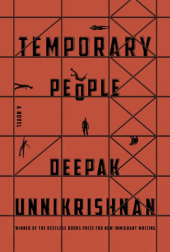 Neuerscheinungen 2017Stand: 2020-02-01 |
Schnellsuche
ISBN/Stichwort/Autor
|
Herderstraße 10
10625 Berlin
Tel.: 030 315 714 16
Fax 030 315 714 14
info@buchspektrum.de |

Deepak Unnikrishnan
Temporary People
A Novel
2017. 272 S. 209.55 mm
Verlag/Jahr: SIMON & SCHUSTER US; RESTLESS BOOKS 2017
ISBN: 1-63206-142-2 (1632061422)
Neue ISBN: 978-1-63206-142-3 (9781632061423)
Preis und Lieferzeit: Bitte klicken
With his stunning, mind-altering debut novel Temporary People, Deepak Unnikrishnan delves into the histories, myths, struggles, and triumphs of migrant workers constructing shrines to excess and luxury even as they live in poverty and work in intolerable conditions.
"Guest workers of the United Arab Emirates embody multiple worlds and identities and long for home in a fantastical debut work of fiction, winner of the inaugural Restless Books Prize for New Immigrant Writing.... The author´s crisp, imaginative prose packs a punch, and his whimsical depiction of characters who oscillate between two lands on either side of the Arabian Sea unspools the kind of immigrant narratives that are rarely told. An enchanting, unparalleled anthem of displacement and repatriation." -Kirkus Reviews
In the United Arab Emirates, foreign nationals constitute over 80 percent of the population. Brought in to construct the towering monuments to wealth that punctuate the skylines of Abu Dhabi and Dubai, this labor force works without the rights of citizenship, endures miserable living conditions, and is ultimately forced to leave the country. Until now, the humanitarian crisis of the so-called "guest workers" of the Gulf has barely been addressed in fiction. With his stunning, mind-altering debut novel Temporary People, Deepak Unnikrishnan delves into their histories, myths, struggles, and triumphs.
Combining the irrepressible linguistic invention of Salman Rushdie and the satirical vision of George Saunders, Unnikrishnan presents twenty-eight linked stories that careen from construction workers who shapeshift into luggage and escape a labor camp, to a woman who stitches back together the bodies of those who´ve fallen from buildings in progress, to a man who grows ideal workers designed to live twelve years and then perish-until they don´t, and found a rebel community in the desert. With this polyphony, Unnikrishnan brilliantly maps a new, unruly global English. Giving substance and identity to the anonymous workers of the Gulf, he highlights the disturbing ways in which "progress" on a global scale is bound up with dehumanization.
"Deepak Unnikrishnan´s novel-in-stories narrates a series of metamorphoses.... a mosaic of the frenetic, fantastical and fragmented lives of the South Asian diaspora in the United Arab Emirates, one that recalls the cry of its closest forebear, Salman Rushdie´s Midnight´s Children: ´Please believe that I am falling apart.´ What separates Unnikrishnan from Rushdie, and the vast literature of exile that precedes them, are his subjects. Temporary People explores the lives of arguably the least privileged class of nomads in the twenty-first century: guest workers. Joining the South Indian writer Benyamin´s Goat Days, a novel of modern-day enslavement in Saudi Arabia, and the British-Emirati director Ali Mostafa´s City of Life, a film that weaves together a cross-section of lives in Dubai, Temporary People is a robust... entry into the nascent portrayal of migrant labor in the Gulf.... Mingling English, Malayalam and Arabic in a series of Kafkaesque parables, Unnikrishnan´s book features a lot of action and even some humor.... Temporary People pairs well with an older cousin in nonfiction, John Berger´s A Seventh Man. In that stirring cri de coeur about migrant labor in Europe, Berger reminds us of a point that is embedded within Unnikrishnan´s stories: Countries that send migrant laborers to global metropolitan centers are often forced to do so.... Unnikrishnan´s collection poses its questions obliquely, but demands explicit answers. What causes a society to look like this?"
-Shaj Mathew, The New York Times Book Review


